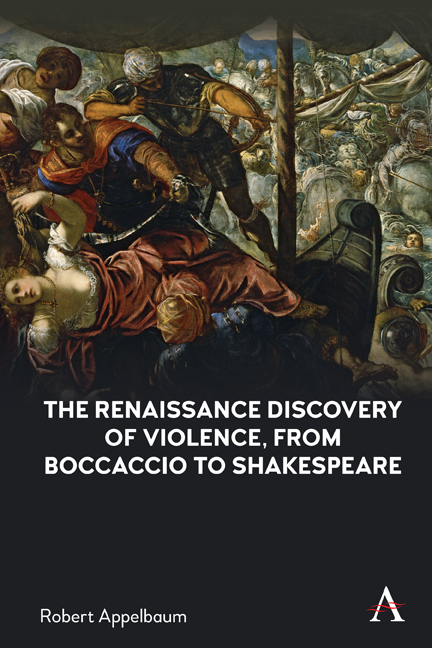Book contents
- Frontmatter
- Dedication
- Contents
- A Note on the Texts
- Acknowledgments
- Preface
- Chapter One Overture: The Show of Violence
- Chapter Two The Moral Economy of Violence in the Renaissance Novella Collection: Straparola, Bandello and Marguerite de Navarre
- Chapter Three Pacifism, Erasmus and More
- Chapter Four Violence as Labor: The Heroic Narrative
- Chapter Five “Tragedy Shows Us What We Must Flee From”
- Afterword
- Select Bibliography
- Index
Chapter Three - Pacifism, Erasmus and More
Published online by Cambridge University Press: 16 December 2021
- Frontmatter
- Dedication
- Contents
- A Note on the Texts
- Acknowledgments
- Preface
- Chapter One Overture: The Show of Violence
- Chapter Two The Moral Economy of Violence in the Renaissance Novella Collection: Straparola, Bandello and Marguerite de Navarre
- Chapter Three Pacifism, Erasmus and More
- Chapter Four Violence as Labor: The Heroic Narrative
- Chapter Five “Tragedy Shows Us What We Must Flee From”
- Afterword
- Select Bibliography
- Index
Summary
Peace is not sought for the purpose of stirring up war, but war is waged for the purpose of securing peace. Be, then, a peacemaker even while you make war, that by your victory you may lead those whom you defeat to know the desirability of peace, for the Lord says, “blessed are the peacemakers for they shall be called the children of God.”
Saint Augustine Epistle to BonifaceThe Pacifist and Just War Traditions
The word “pacifism” does not appear in most European languages until the early twentieth century. Before then there were ideas about peacemaking and peaceful living going back to the Gospels, if not sooner in the Jewish Bible, along with ideas corresponding to what came to be called “just war theory.” Premodern pacifism is sometimes called “irenicism,” since many of its proponents were not in all cases against a recourse to violence. (Above all, they were at best ambivalent about war against non-Christians.) But a recognizable strain of pacifism nevertheless persisted throughout the Christian era, and came to find one of its most original and influential expressions in the early sixteenth century—the same period as we have just looked at with regard to the Renaissance novella collection. “Survey the life of Christ from start to finish,” Erasmus wrote—Desiderius Erasmus of Rotterdam, the leading light of Northern Humanism, and the most prominent of Renaissance pacifists—“and what else is it but a lesson in concord and mutual love? What do all this commandments and parables teach if not peace and love for one another?” Pacifism before the letter, it was, if you will: adherence to this total message, communicated in “commandments and parables,” however hard it may ever be to put it into practice, combined with a cautious optimism about what humans are capable of.
One way to look at early modern pacifism is to view it on a spectrum. At one end of the spectrum would be brazen militarism, whether for its own sake or for the purposes of holy war, for glory or for domination, for honor or for pillage, in keeping with what we have seen called a “normativity” of violence in the Middle Ages. Next might come the militarism of civic republicanism, whose chief exponent was Machiavelli—militarism for the sake of civic self-defense, and thus also for the sake of encouraging liberty and virtù.
- Type
- Chapter
- Information
- Publisher: Anthem PressPrint publication year: 2021



